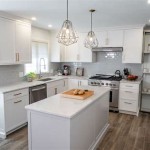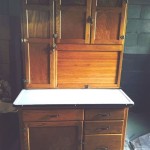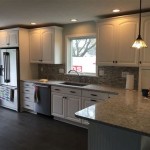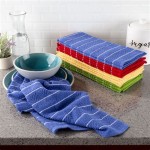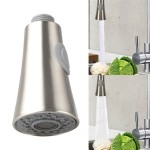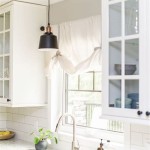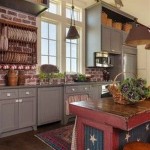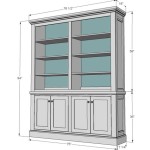Types of Kitchen Countertops: Pros and Cons
The kitchen countertop is a central feature of any kitchen, playing a crucial role in both functionality and aesthetics. It serves as a work surface for food preparation, a gathering spot for family and friends, and a focal point for the entire room. Choosing the right countertop material is a significant decision, as it impacts the overall look, durability, and longevity of your kitchen. With a wide variety of materials available, each with its unique pros and cons, it’s essential to carefully consider your needs and preferences before making a choice.
Granite
Granite is a natural stone known for its elegant beauty, durability, and heat resistance. It comes in a wide range of colors and patterns, making it easy to find a style that complements any kitchen design. Granite is also highly resistant to scratches and stains, making it a practical choice for busy kitchens. However, granite is a porous material and requires regular sealing to prevent staining. It can be expensive, especially for higher-quality slabs.
Pros:
- Durable and scratch-resistant
- Heat-resistant
- Available in a variety of colors and patterns
- Adds value to your home
Cons:
- Can be expensive
- Requires regular sealing
- Porous and can be prone to staining
- Heavy material, requiring professional installation
Quartz
Quartz countertops are engineered stone, created by combining ground quartz crystals with resin and pigments. This process results in a non-porous, durable surface that is highly resistant to scratches, stains, and heat. Quartz countertops come in a wide variety of colors and designs, mimicking the look of natural stone while offering greater uniformity. However, quartz is a non-renewable resource and can be more expensive than some other countertop materials.
Pros:
- Non-porous and stain-resistant
- Durable and scratch-resistant
- Heat-resistant
- Available in a wide range of colors and patterns
- Low maintenance
Cons:
- Can be expensive
- Not as natural as granite or marble
- Can be susceptible to etching from acidic substances
- May not be as eco-friendly as other materials
Marble
Marble is a luxurious natural stone known for its elegant veining and unique patterns. It is softer than granite and quartz, making it more susceptible to scratches and stains. Marble is also porous and requires regular sealing to prevent staining. However, its timeless beauty and luxurious feel make it a popular choice for high-end kitchens. Marble is also highly heat-resistant and can be used for both countertops and backsplashes.
Pros:
- Elegant and timeless beauty
- Heat-resistant
- Unique veining and patterns
- Adds value to your home
Cons:
- Expensive
- Soft and prone to scratches and stains
- Porous and requires regular sealing
- Susceptible to etching from acidic substances
Laminate
Laminate countertops are a budget-friendly option that offers a wide range of colors and patterns. They are made by bonding thin layers of plastic to a core material, creating a durable and water-resistant surface. Laminate is also easy to clean and maintain, making it a practical choice for busy kitchens. However, laminate is not as durable as natural stone or engineered stone, and can be susceptible to scratches and heat damage.
Pros:
- Budget-friendly
- Wide range of colors and patterns
- Easy to clean and maintain
- Water-resistant
Cons:
- Not as durable as natural stone or engineered stone
- Susceptible to scratches and heat damage
- Seams can be visible
- May not be as stylish as higher-end materials
Butcher Block
Butcher block countertops are made from hardwood, typically maple or walnut. They are known for their warmth, rustic charm, and practicality. Butcher block surfaces are durable and heat-resistant, making them ideal for food preparation. They are also easily refinishable, allowing you to repair minor scratches and dents. However, butcher block countertops require regular maintenance, including oiling to prevent drying and cracking.
Pros:
- Warm and rustic charm
- Durable and heat-resistant
- Easy to refinish
- Eco-friendly
Cons:
- Requires regular maintenance, including oiling
- Susceptible to scratches and stains
- Can be expensive
- Not as water-resistant as some other materials
Solid Surface
Solid surface countertops are made from a non-porous material that is a mixture of acrylic resin, polyester resin, and mineral filler. They are known for their seamless appearance, durability, and ease of maintenance. Solid surface countertops are also resistant to scratches, stains, and heat, making them a practical choice for busy kitchens. However, they can be prone to scratches and may require some sanding and polishing to repair them.
Pros:
- Seamless appearance
- Durable and scratch-resistant
- Stain-resistant
- Heat-resistant
- Easy to clean and maintain
Cons:
- Not as heat-resistant as some other materials
- Scratches can be difficult to repair
- May not be as stylish as natural stone
- Can be expensive
When choosing your kitchen countertops, consider your budget, lifestyle, and aesthetic preferences. Each material offers unique benefits and drawbacks, so it’s important to weigh your options carefully to find the best fit for your needs.

How To Choose Best Material For Your Kitchen Countertop

How To Choose Best Material For Your Kitchen Countertop

Quartzite Countertops Pros And Cons

How To Choose Best Material For Your Kitchen Countertop

Quartzite Countertops Pros And Cons A Few Secrets You Need To Know Lantern Lane Designs

Diffe Types Of Kitchen Countertops Rochon

Various Kitchen Countertops Pros Cons Life On Virginia Street

The Pros And Cons Of Diffe Kitchen Countertop Materials Ranney Blair Weidmann

Pros And Cons Of Each Type Kitchen Countertops Ahs

Pros Cons Of Quartz Countertops R D Marble Inc
Related Posts

